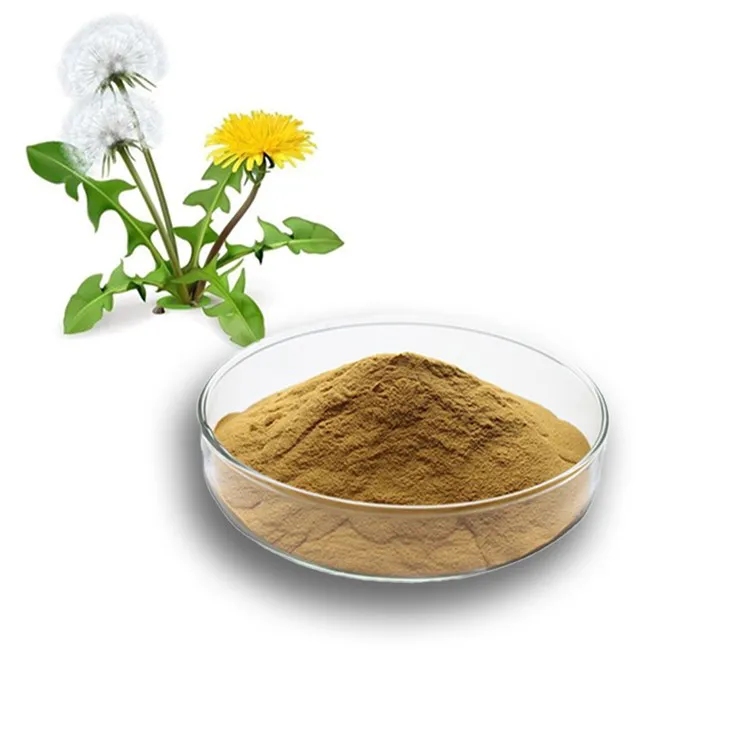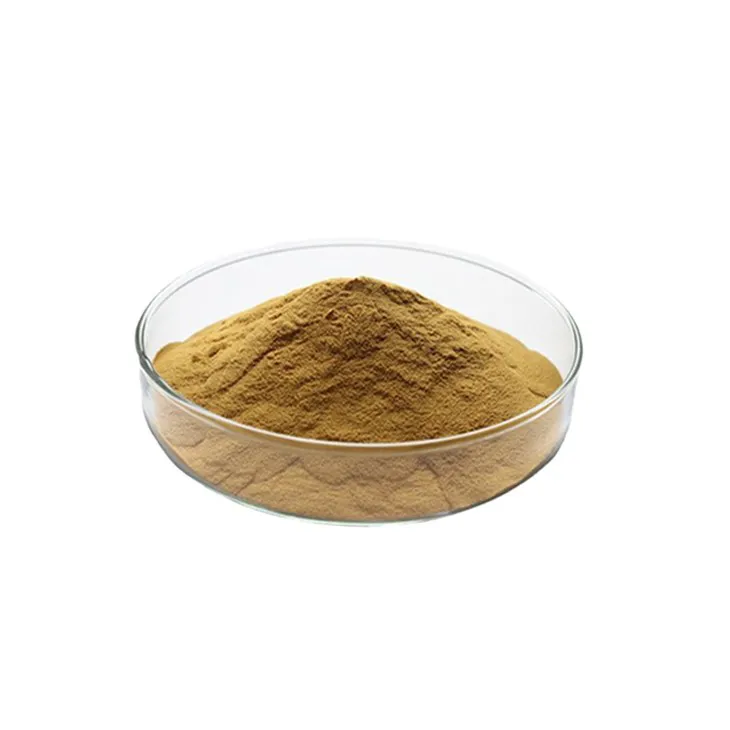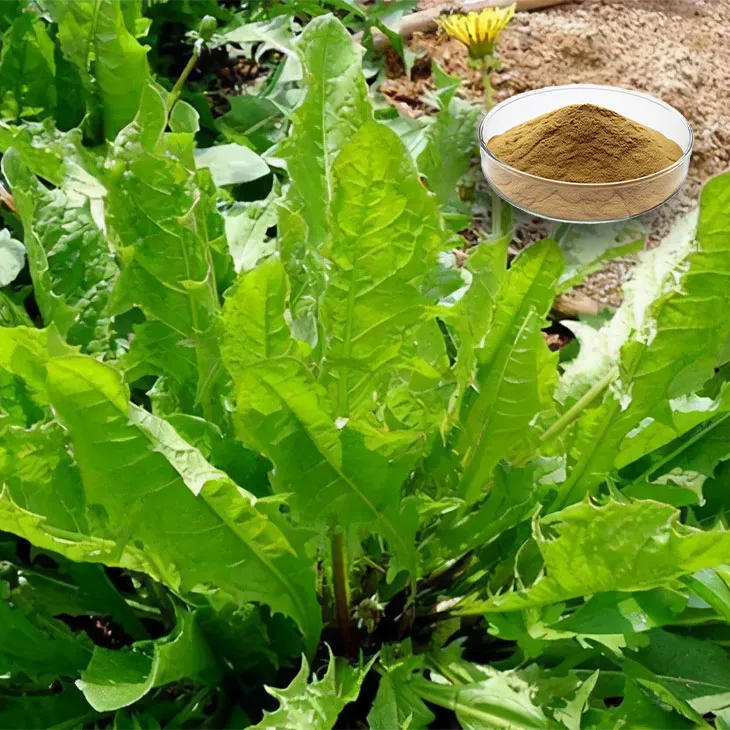- 0086-571-85302990
- sales@greenskybio.com
Five Benefits of Dandelion Leaf Extract + Dosage and Side Effects
2024-11-14

1. Introduction
Dandelion (Taraxacum officinale) has been used for centuries in traditional medicine. Dandelion Leaf Extract, in particular, is gaining popularity as a natural remedy. This extract is rich in various nutrients and bioactive compounds, which contribute to its potential health benefits. In this article, we will explore five major benefits of Dandelion Leaf Extract, as well as its recommended dosage and possible side effects.

2. Five Benefits of Dandelion Leaf Extract
2.1. Digestive Health
Stimulates Digestion: Dandelion leaf extract contains bitter compounds that can stimulate the production of digestive juices, including bile, gastric acid, and pancreatic enzymes. This helps in the breakdown and absorption of food. For example, bile is essential for the emulsification of fats, and by increasing its production, dandelion leaf extract can improve fat digestion.
Relieves Constipation: The extract has a mild laxative effect. It contains dietary fiber which adds bulk to the stool and promotes regular bowel movements. This can be beneficial for those who suffer from occasional constipation. Additionally, it helps to keep the digestive tract clean and healthy.
2.2. Detoxification
Liver Support: Dandelion leaf extract is known for its hepatoprotective properties. The liver is the body's major detoxifying organ, and dandelion helps to support its function. It can assist in the removal of toxins from the body by promoting the production of glutathione, an important antioxidant in the liver that plays a key role in detoxification processes.
Kidney Function: It also has a positive effect on kidney health. Dandelion leaf extract is a diuretic, which means it increases urine production. This helps the kidneys to flush out waste products and excess fluids from the body. By promoting healthy kidney function, it can contribute to overall detoxification.
2.3. Anti - inflammatory Properties
Reduces Inflammation: Dandelion leaf extract contains anti - inflammatory compounds such as polyphenols. Chronic inflammation is associated with many diseases, including arthritis, heart disease, and certain cancers. By reducing inflammation in the body, dandelion leaf extract may help to lower the risk of these diseases or alleviate symptoms in those already affected.
Skin Health: The anti - inflammatory properties of the extract can also benefit the skin. It can be used topically or consumed orally to help soothe skin conditions such as eczema, psoriasis, and acne. By reducing inflammation in the skin, it can promote healing and improve the overall appearance of the skin.
2.4. Immune System Boost
Rich in Nutrients: Dandelion leaf extract is a good source of vitamins (such as vitamin C, vitamin A, and various B - vitamins) and minerals (including potassium, iron, and zinc). These nutrients are essential for a healthy immune system. Vitamin C, for example, is well - known for its immune - boosting properties, as it helps in the production of white blood cells.
Antioxidant Activity: The extract also contains antioxidants that can protect the immune cells from damage caused by free radicals. Free radicals are unstable molecules that can damage cells and weaken the immune system. By neutralizing these free radicals, dandelion leaf extract helps to keep the immune system strong and functioning properly.
2.5. Blood Sugar Regulation
Controls Blood Glucose: Some studies suggest that dandelion leaf extract may have a positive effect on blood sugar levels. It may help to improve insulin sensitivity, which is crucial for the proper regulation of blood glucose. This can be beneficial for people with diabetes or those at risk of developing diabetes.
Reduces Insulin Resistance: By reducing insulin resistance, dandelion leaf extract allows the body's cells to respond better to insulin. Insulin is the hormone responsible for transporting glucose from the bloodstream into the cells, where it can be used for energy. When cells become resistant to insulin, blood sugar levels can rise.

3. Dosage of Dandelion Leaf Extract
The appropriate dosage of dandelion leaf extract can vary depending on several factors, including the form of the extract (e.g., tincture, capsule, or powder), the intended use, and individual health conditions.
Tincture: For a dandelion leaf tincture, a common dosage is 2 - 5 milliliters, taken up to three times a day. It is usually diluted in a small amount of water before consumption.
Capsules: When using dandelion leaf extract capsules, the typical dosage is 500 - 1000 milligrams per day. However, it is important to follow the instructions on the product label.
Powder: If consuming dandelion leaf powder, a starting dose might be around 1 - 2 grams per day, which can be mixed into drinks or food. It is advisable to start with a lower dose and gradually increase it if needed, while monitoring for any potential reactions.
It is always best to consult a healthcare professional before starting any new supplement regimen, especially if you have underlying health conditions or are taking medications.

4. Side Effects of Dandelion Leaf Extract
While dandelion leaf extract is generally considered safe for most people, there are some potential side effects to be aware of.
Allergic Reactions: Some individuals may be allergic to dandelion. Allergic reactions can range from mild symptoms such as skin rashes, itching, and hives to more severe reactions like difficulty breathing or anaphylaxis. If you have a known allergy to plants in the Asteraceae family (which dandelion belongs to), you should avoid dandelion leaf extract.
Digestive Upset: In some cases, taking dandelion leaf extract may cause digestive discomfort. This can include symptoms such as nausea, vomiting, diarrhea, or abdominal cramps. If these symptoms occur, it may be necessary to reduce the dosage or discontinue use.
Interaction with Medications: Dandelion leaf extract may interact with certain medications. For example, because it is a diuretic, it can potentially increase the effects of other diuretic medications, leading to excessive fluid loss. It may also interact with medications that are metabolized by the liver, such as some statins and blood thinners. Therefore, if you are taking any medications, it is crucial to inform your doctor before using dandelion leaf extract.

5. Conclusion
Dandelion leaf extract offers several potential health benefits, including improved digestive health, detoxification, anti - inflammatory effects, immune system support, and blood sugar regulation. However, it is important to use it in the appropriate dosage and be aware of the possible side effects. As with any natural supplement, it is advisable to consult a healthcare professional before incorporating dandelion leaf extract into your health routine.
FAQ:
What are the five benefits of Dandelion Leaf Extract?
Dandelion leaf extract has several benefits. Firstly, it may support liver health by promoting the production of bile, which aids in digestion and helps the liver in its detoxification processes. Secondly, it has diuretic properties, which can help increase urine production and potentially assist in flushing out excess fluids and toxins from the body. Thirdly, it is rich in antioxidants such as vitamin C and beta - carotene. These antioxidants can help combat free radicals in the body, reducing oxidative stress and potentially protecting against chronic diseases. Fourthly, it may have anti - inflammatory effects, which can be beneficial for various inflammatory conditions in the body. Fifthly, some studies suggest that it may help regulate blood sugar levels, although more research is needed in this area.
How should Dandelion Leaf Extract be dosed?
The dosage of dandelion leaf extract can vary depending on the form (e.g., capsule, tincture) and the intended use. As a general guideline, for dried dandelion leaf used in teas, about 1 - 2 teaspoons of dried leaves per cup of boiling water can be used. For tinctures, a typical dosage might be 1 - 3 ml, up to three times a day. However, it is important to consult a healthcare provider before starting any new supplement regimen, especially if you have underlying health conditions or are taking medications.
What are the possible side effects of Dandelion Leaf Extract?
Some possible side effects of dandelion leaf extract include allergic reactions in individuals who are sensitive to dandelions. Since it has diuretic properties, excessive use may lead to dehydration if fluid intake is not increased accordingly. It may also interact with certain medications, such as diuretics and drugs that are metabolized by the liver. Additionally, in some cases, it may cause digestive upset, including nausea, vomiting, or diarrhea.
Can Dandelion Leaf Extract interact with medications?
Yes, dandelion leaf extract can interact with medications. As mentioned, it has diuretic properties, so it may interact with other diuretic medications, potentially increasing the risk of excessive fluid loss and electrolyte imbalances. It may also interact with medications that are metabolized by the liver, as it can affect liver enzyme activity. Therefore, if you are taking any medications, it is crucial to inform your healthcare provider before using dandelion leaf extract.
Is Dandelion Leaf Extract suitable for everyone?
Dandelion leaf extract is not suitable for everyone. People with known allergies to dandelions should avoid it. Pregnant or breastfeeding women should also be cautious, as there is not enough research to determine its safety in these populations. Additionally, those with certain medical conditions, such as kidney or liver problems, should consult a healthcare provider before using it, as its effects on these organs may need to be carefully monitored.
Related literature
- The Health Benefits of Dandelion: A Review"
- "Dandelion Leaf Extract: Pharmacological Properties and Potential Applications"
- "Interactions between Dandelion and Conventional Medications"
- ▶ Hesperidin
- ▶ citrus bioflavonoids
- ▶ plant extract
- ▶ lycopene
- ▶ Diosmin
- ▶ Grape seed extract
- ▶ Sea buckthorn Juice Powder
- ▶ Beetroot powder
- ▶ Hops Extract
- ▶ Artichoke Extract
- ▶ Reishi mushroom extract
- ▶ Astaxanthin
- ▶ Green Tea Extract
- ▶ Curcumin Extract
- ▶ Horse Chestnut Extract
- ▶ Other Problems
- ▶ Boswellia Serrata Extract
- ▶ Resveratrol Extract
- ▶ Marigold Extract
- ▶ Grape Leaf Extract
- ▶ blog3
- ▶ blog4
- ▶ blog5
-
Organic Tongkat Ali extract powder factory.
2024-11-14
-
How to make powder with ashwagandha extract.
2024-11-14
-
Rosehip extract manufacturers from China.
2024-11-14
-
The best cat's claw extract in nature.
2024-11-14
-
Chinese Dandelion Leaf Extract Suppliers.
2024-11-14
-
Troxerutin
2024-11-14
-
Tinospora cordifolia extract
2024-11-14
-
Bamboo Leaf extract
2024-11-14
-
Astaxanthin
2024-11-14
-
Red Date Extract
2024-11-14
-
Thunder God Vine Extract
2024-11-14
-
Acerola Juice Powder
2024-11-14
-
Chia Seed Powder
2024-11-14
-
Beta Carotene
2024-11-14
-
Senna Leaf Extract
2024-11-14





















